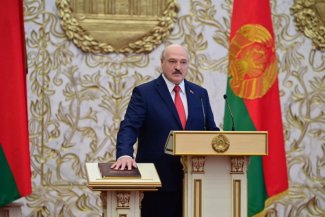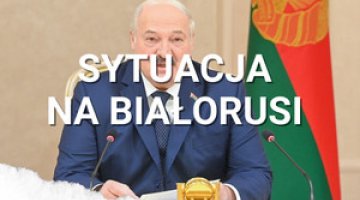Belarus: inauguration overshadowed by demonstrations

On 27 September more peaceful protests took place in Belarus, representing the peak of the weekly protests against Alyaksandr Lukashenka which have been going on for almost two months now. The largest demonstration, with the participation of between 80,000 and 100,000 people, was held in Minsk. Much smaller protests (estimated from several hundred to several thousand participants) by opponents of the government also took place in Homel, Vitsiebsk, Mahiliou and Hrodna, as well as in regional towns including Valkavysk, Salihorsk, Lida, Orsha and Baranavichy). The law enforcement forces did not suppress them with violence: they limited themselves to blocking streets, protecting public facilities and detaining selected demonstrators. Over 340 people were detained nationwide. The officers are gradually behaving more brutally, especially towards the participants in smaller demonstrations in regional cities, where tear gas, rubber bullets and flashbangs were used together with direct coercion. Arrests also took place during the women’s march in Minsk on Saturday, which about one to two thousand people attended.
The activity of hackers, the so-called ‘cyberpartisans’ has also been continuing unabated. They succeeded in temporarily taking over administrative privileges on the websites of state-owned TV stations BT-1 and ONT on 26 September, and interrupted the evening news service broadcasts with material about the militia’s brutal actions against protesters. For its part, the government is increasing the pressure on the independent media: on 25 September, the Ministry of Information filed a motion in court to deprive the most popular independent news website Tut.by of its status as a mass media organisation, which will prevent its journalists from legally attending large-scale events, including anti-regime demonstrations.
The slogan of the protest actions on Sunday was the inauguration of the ‘real president’, i.e. Sviatlana Tsikhanouskaya. This was a response to Alyaksandr Lukashenka’s unannounced swearing-in on 23 September, in a private ceremony which was not broadcast on state media. The governments of EU countries (including Slovakia, the Czech Republic, Lithuania, Latvia, Estonia, Denmark, Poland and Germany) have stated that they will not recognise his presidency as having been won in an undemocratic manner. The US, Canada and Ukraine have also adopted this position. A similar message was issued by Tsikhanouskaya, who was in Lithuania, and by the members of the presidium of the Coordination Council, Pavel Latushka and Volha Kavalkova, who are in exile in Poland, and appealed for Western countries and Russia to mediate in dialogue with the Belarusian government; they also announced that they would be ready to return to Belarus if international guarantees of their safety could be obtained.
The Belarusian government has consistently rejected the possibility of dialogue, and is maintaining the narrative that it has the right to regulate the internal situation without outside interference. The Belarusian foreign minister Uladzimir Makey, who spoke at the UN General Assembly on 26 September, deemed the sanctions imposed on Belarus to be pointless. The government has also rejected the proposals addressed to it by organisations of Belarusian private entrepreneurs to undertake joint corrective measures to the economy.
Commentary
- Both the women’s march on Saturday and the Sunday demonstrations were less numerous than the protests organised on previous weekends. The drop in numbers was smallest in the capital, where opponents of the regime still have considerable mobilisation potential. However, a stronger downward trend can be observed in the regions, including such previously active centres as Hrodna and Brest. Although the poor weather should be taken into account, it seems that this is mainly a sign of discouragement at the relentlessness of the authorities and the lack of concrete achievements after almost two months of protests. It is also worth considering the tactics of the law enforcement forces, which have been operating in a much more brutal way against smaller groups of demonstrators; if the protests decline in the provinces, this may lead to a further fall-off in the number of demonstrations. At the same time, great public discontent persists, and the demonstrators have not given up on peaceful protests. This means we should not expect a quick settlement to the confrontation between the government and the rebellious part of Belarusian society.
- The initiation of proceedings against the Tut.by website shows the authorities’ determination to gradually reduce the scope of activities by independent media and social networks, which the regime perceives as the main channel of communication and mobilisation for the demonstrators. Journalists are still being detained during the demonstrations, even when they have the appropriate permits. An additional pretext prompting the authorities to increase repression against independent journalists, and to increase control over the IT sector (which Lukashenka has criticised for supporting the protests) may be the rise in activity by hackers, which threatens the security of the state’s ICT networks.
- The covert inauguration of Alyaksandr Lukashenka for another term was unprecedented, probably due to the authorities’ fear of escalating the citizens’ anger even further. By depriving the swearing-in ceremony of its traditional media coverage and ceremonial character, Lukashenka is in fact admitting that he does not have full control over the internal situation, as well as demonstrating his weakness. This could lead to a further erosion of the president’s authority, which has already been weakened by many weeks of demonstrations and manifestations of disobedience by numerous professional groups (including health care workers and some lecturers in academia).
- The political initiatives by the exiled members of the Coordination Council are aimed at mobilising protests in the country and maintaining Western interest in the situation in Belarus. For many weeks, the Belarusian authorities have been consistently rejecting all proposals for dialogue with the rebellious part of society, while falling into ever deeper isolation on the international stage. At the same time Belarusian diplomacy, by using the forum of the UN, is trying to demonstrate a constructive and peaceful attitude towards international policy. However, as one state after another refuses to recognise Lukashenka’s presidency, this is a doomed attempt to maintain elements of Minsk’s active policy of promoting Belarus as a stabiliser of the situation in Eastern Europe which it had been conducting before the elections.
- The regime denies there is any need to start talks about its economy, even though it is threatened with collapse and, as a result of the collapse of dialogue with the West, may lose its creditworthiness on international financial markets completely in the next few months. It seems that Alyaksandr Lukashenka is aiming, both politically and economically, to maintain the authoritarian model in full, and to further increase the role of the state in the social and economic spheres.




